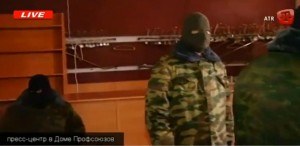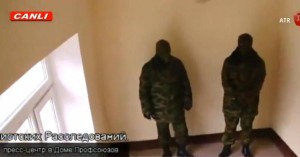 As Russian troops streamed into Crimea, Ukraine, yesterday, masked gunmen broke into and seized the office of the
As Russian troops streamed into Crimea, Ukraine, yesterday, masked gunmen broke into and seized the office of the  , a hub for independent media in the region, and the Crimean investigative center.
, a hub for independent media in the region, and the Crimean investigative center.
After breaking a window and forcing their way through the front door, militia leader Konstantin Knyrik announced that the offices would now house  representatives of “The Crimean Front,” because from “this building does not come true information.”
representatives of “The Crimean Front,” because from “this building does not come true information.”
“We do not need to escalate this,” Knyrik told the journalists, according to the Crimean investigative center’s website. “All employees can come to work. We promise them, if their sponsors refuse to pay the salary, we will find them entrepreneurs. We will try to agree on the correct truthful coverage of events.”
The journalists managed to leave with “part” of their files and equipment, reported the website. Oleg Khomenok, an investigative journalism trainer based in Kiev, adds that the staff is safe and is continuing to post news on their website.
The seizure of the media offices comes on top of growing hostility to news media in Crimea. An armed group of 20 men has surrounded the national TV and radio network Krym in Simferopol, and journalists report being harassed at armed checkpoints. “I am deeply concerned about the media freedom situation in Simferopol and the Crimean peninsula as a whole, following the current political developments in Ukraine,” said Dunja Mijatović, the Representative on Freedom of the Media for the Organization for Security and Cooperation in Europe (OSCE). “Safety of media workers must be ensured at all times and their work must be respected.”
The Crimean Center for Investigative Journalism, founded in 2012, has run investigative projects and conducted training for journalists from Crimea and elsewhere in Ukraine, as well as from neighboring Belarus. Their staff have become known for their hard-hitting reports on corruption and national security, and produced a TV program, “National Security Issue.”
The Crimean Center is one of two members in Ukraine of the Global Investigative Journalism Network (GIJN), an association of 91 nonprofit groups in 41 countries dedicated to investigative reporting. The Center is funded by grants from such donors as the International Renaissance Fund, the Ukraine branch of the Open Society Foundations; the U.S. Agency for International Development; and SCOOP, a Denmark-based network that supports investigative journalism in Eastern Europe.
Over the weekend, GIJN quietly worked with the Archive-It service of the San Francisco-based Internet Archive to back up the Crimean Center’s entire web history – nearly 16,000 pages. The Internet Archive is a non-profit digital library that has become the pre-eminent archive of the online world. “This is a great example of how our digital library can help — both for the near-term public interest and well as for historical reflection,” says Roger Macdonald, director of the group’s Television Archive. “Now there is a permanent, safe record of everything the Crimean Center has published online.”

David E. Kaplan is executive director of the Global Investigative Journalism Network, which co-sponsors the biennial Global Investigative Journalism Conference. He is former director of the International Consortium of Investigative Journalists, a senior editor at the Center for Investigative Reporting, and chief investigative correspondent for U.S. News & World Report.
